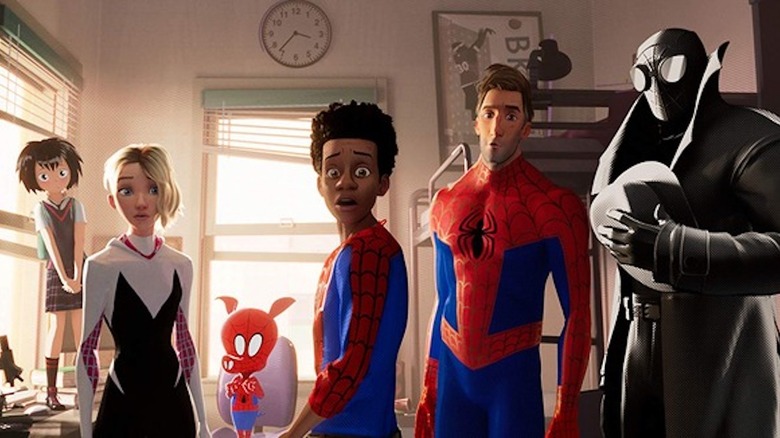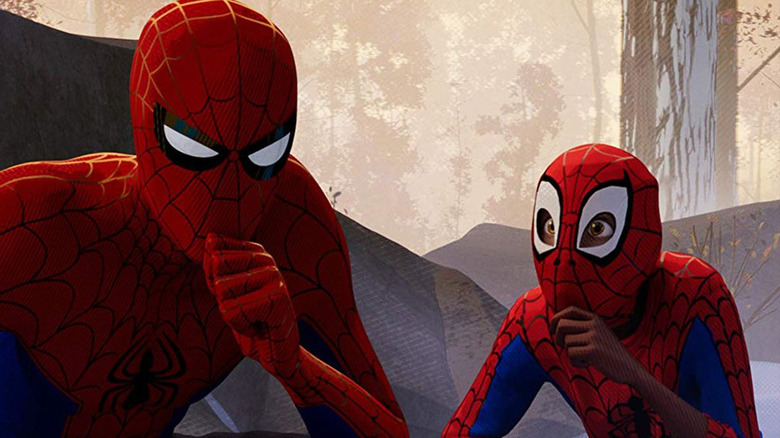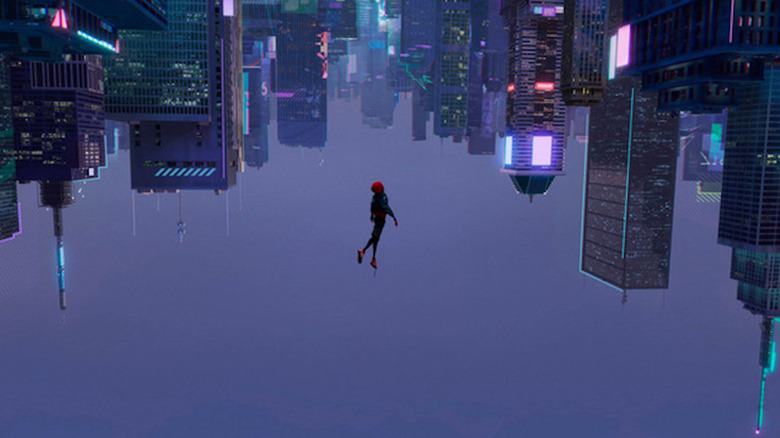Spider-Man: Into The Spider-Verse Was Met With A Lot Of Doubt From Studio Executives
There isn't a superhero who's captured the hearts and aspirations of comic book readers more fervently than Stan Lee and Steve Ditko's Spider-Man. Ever since the character's introduction 61 years ago in the fifteenth issue of Marvel Comics' "Amazing Fantasy," the web-slinger has hooked 'em young with the universal origin story of Peter Parker, a nerdy teenager transformed by a radioactive arachnid (and the preventable murder of his Uncle Ben) into a quip-happy, crime-fighting dynamo. Every kid can relate to Parker's journey, and, as we grow older, our inner-child's fondness for the wall-crawler only deepens.
Though Spider-Man belongs to all of us, the character's massive popularity left open the possibility of an iteration that directly appealed to non-white fans. Finally, in 2011 (40 years after DC introduced the Black character John Stewart as a new member of the Green Lantern Corps), Brian Michael Bendis and Sara Pichelli thrust Miles Morales, a young man of Black and Puerto Rican parentage, into the red-and-blue suit. The character was a massive hit with non-bigoted readers, which, given the big-screen success of Sam Raimi's "Spider-Man" film trilogy for Sony, suggested that Miles would be just as warmly received on the big-screen.
After Sony's "The Amazing Spider-Man" reboot starring Andrew Garfield failed to catch fire, the studio asked its hyper-creative golden boys, Phil Lord and Chris Miller (of the "Cloudy with a Chance of Meatballs," "The LEGO Movie" and "21 Jump Street" franchises) to revive the character. They immediately pitched an adaptation of the Morales-led "Spider-Verse" run written by Dan Slott. Though Sony eventually gave them the green light, they did so with some hesitance.
How many Spider-Mans can an audience handle?
Superhero multiverse yarns might be all the rage in 2023, but the notion of flooding a narrative with different versions of Spider-Man from the Marvel universe wasn't an immediate hit with the execs. In an interview with Empire Magazine, Phil Lord addressed these doubts:
"There've been a bunch of multiverse things since ours came out. When we started on ['Into the Spider-Verse'], studios were nervous that audiences wouldn't be able to follow this idea of parallel dimensions. But audiences are smarter than people give them credit for. [Our film] opened the door for people to do things they wanted to do, but were afraid would be too out-there."
Audiences can be smart, but you have to capture their imagination to get them fully engaged. As evidenced by their previous work (which also includes the hilarious animated series "Clone High"), Lord and Chris Miller have a unique knack for dazzling viewers with narratives that seamlessly blend silliness with seriousness. It's a miraculous high-wire act that, to date, they effortlessly navigate every time.
How many mulitverse tales can moviegoers stomach?
If there's a downside to the critical and commercial success of Phil Lord and Chris Miller's "Spider-Verse" franchise (which includes vital assists from such immensely talented folks as Peter Ramsey, Rodney Rothman, and Kemp Powers), it's that the Marvel Cinematic Universe and DC Universe have glommed onto the concept. Though the results have generally been enjoyable, I feel like we're going to hit peak-multiverse before both brands' phases draw to their conclusions (which are years down the road).
I sincerely hope this doesn't diminish the impact of Lord and Miller's OG superhero multiverse, because, being animated, they can experiment with gorgeously bewildering images that are more striking than anything you can pull off with live-action. Filmmakers have been trying to replicate the experience of reading a comic book for decades and some have come close (e.g. Sam Raimi, Richard Donner, and Ang Lee). But Lord and Miller have crafted the gold standard. It would be a shame if they were copycatted to death.


